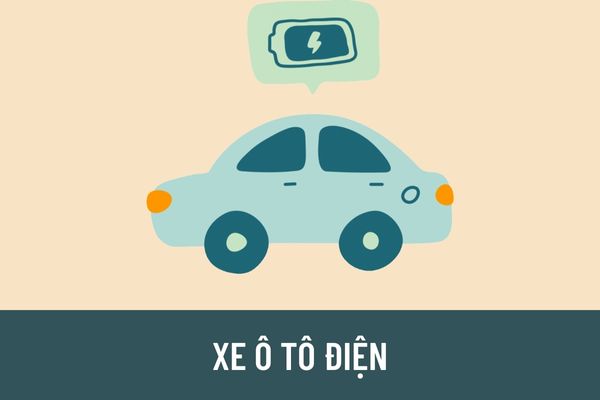Types of Taxes Required When Importing Electric Cars? Can Individuals Import Electric Cars for Business Purposes?
What is an electric car?
Currently, the law does not have specific regulations regarding electric cars. However, according to common understanding, electric cars are a type of vehicle powered by electric motors. Instead of using internal combustion engines with fuels such as gasoline or diesel, electric cars utilize energy stored in a rechargeable battery pack.
Some popular electric cars on the market today include the Tesla Model Y, Nissan Leaf, Chevrolet Bolt, Porsche Taycan, etc. These vehicles offer advantages such as reduced fuel costs, lower maintenance costs compared to gasoline cars, and price incentives in some countries.
However, when importing electric cars into Vietnam, accompanied by the applicable tax rates, the price of electric cars has increased considerably.

What types of taxes must be paid when importing electric cars? Can individuals import electric cars for business purposes?
What types of taxes must be paid when importing electric cars from abroad into Vietnam?
Electric cars imported from abroad into Vietnam are subject to the following taxes under Vietnamese law:
- Import tax
- Special consumption tax
- Value-added tax
Import tax for electric cars:
For electric cars imported from ASEAN countries, the preferential import tax rate is as follows: The ASEAN Trade in Goods Agreement (ATIGA), effective from January 1, 2018, stipulates a 0% import tax rate on electric cars with a localization rate of 40% or more within the ASEAN bloc.
For electric cars imported from non-ASEAN countries such as France, Germany, Italy, Japan, and Korea, the import tax rate ranges from 56% to 74% of the car's value.
Special consumption tax for electric cars:
The special consumption tax rate for imported electric cars is specified in Clause 4, Article 1 of the Amended Special Consumption Tax Law 2014 (Point g, Clause 4, Section I of the Tax Rate Table amended by Article 8 of the Law on Amendments to the Public Investment Law, Public-Private Partnership Law, Investment Law, Housing Law, Bidding Law, Electricity Law, Enterprise Law, Special Consumption Tax Law, and Civil Judgment Enforcement Law 2022) as follows:
The special consumption tax rate for battery-electric cars, for vehicles carrying up to 9 people, from March 1, 2022, to February 28, 2027, is 3%; from March 1, 2027, the new applicable tax rate will be 11%. Other electric cars, for vehicles carrying up to 9 people, will apply a tax rate of 15%.
Value-added tax for electric cars:
The current value-added tax rate is 10%, applicable to all types of cars, including electric cars.
Additionally, under Clause 7, Article 3 of Decree 10/2022/ND-CP on registration fees, automobiles are subject to registration fees. However, from March 1, 2022, based on Point c, Clause 5, Article 8 of Decree 10/2022/ND-CP, the registration fee rate for electric cars is as follows:
Registration fee rate by percentage (%)
...
c) Battery-electric cars:
- Within 3 years from the effective date of this Decree: pay the first-time registration fee at a rate of 0%.
- In the next 2 years: pay the first-time registration fee at 50% of the rate applicable to gasoline or diesel cars with the same seating capacity.
Thus, the registration fee rate for electric cars is 0% within 3 years from March 1, 2022.
Can individuals import electric cars for business purposes?
According to Article 14 of Decree 116/2017/ND-CP on automobile import business:
General provisions on automobile import business
1. Only enterprises are eligible to be granted a license for the automobile import business.
2. Enterprises are entitled to import automobiles after meeting the conditions and being granted an automobile import business license in accordance with this Decree.
3. Enterprises importing automobiles must comply with the regulations on automobile import management in this Decree and other relevant legal documents.
Hence, individuals are not eligible for an automobile import business license.
Moreover, an enterprise wishing to engage in the import business of automobiles must meet the conditions outlined in Article 15 of Decree 116/2017/ND-CP as follows:
Conditions for automobile import business
An enterprise established under the provisions of the law will be granted an automobile import business license when meeting the following conditions:
1. Having a vehicle warranty and maintenance facility owned by the enterprise, or rented by the enterprise under a contract, or belonging to the enterprise's authorized dealer network, meeting the regulations of this Decree.
2. Having a written confirmation or documentation proving that the enterprise is authorized to represent the foreign automobile manufacturer or assembler to carry out the recall of imported automobiles in Vietnam.
An enterprise meeting the above conditions must submit an application for an automobile import business license directly or through the postal system or other suitable methods to the Ministry of Industry and Trade in accordance with Article 16 of Decree 116/2017/ND-CP.
LawNet
